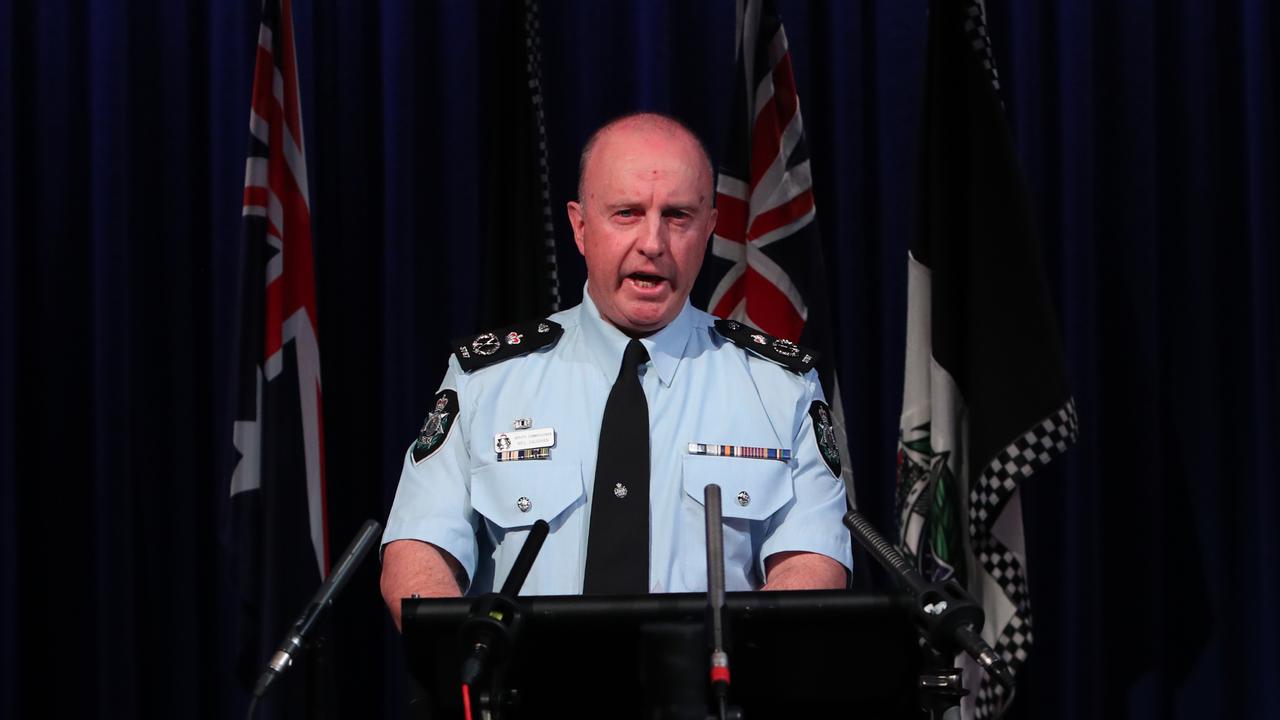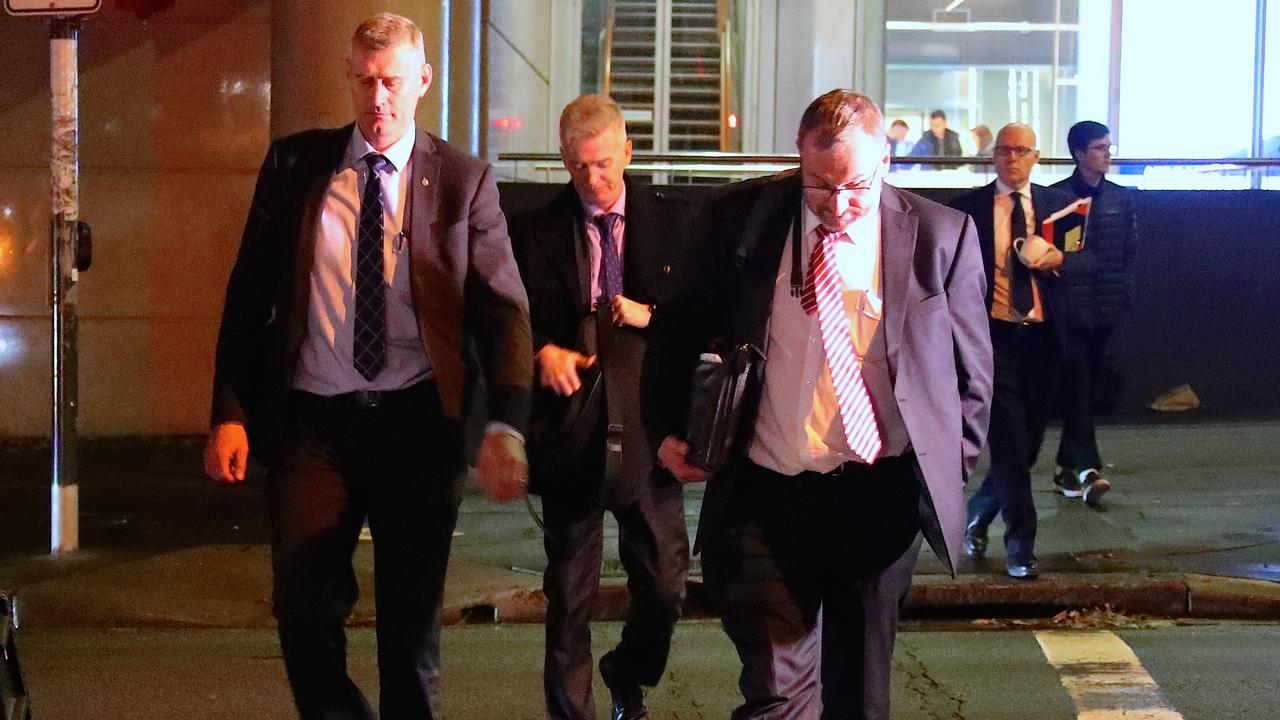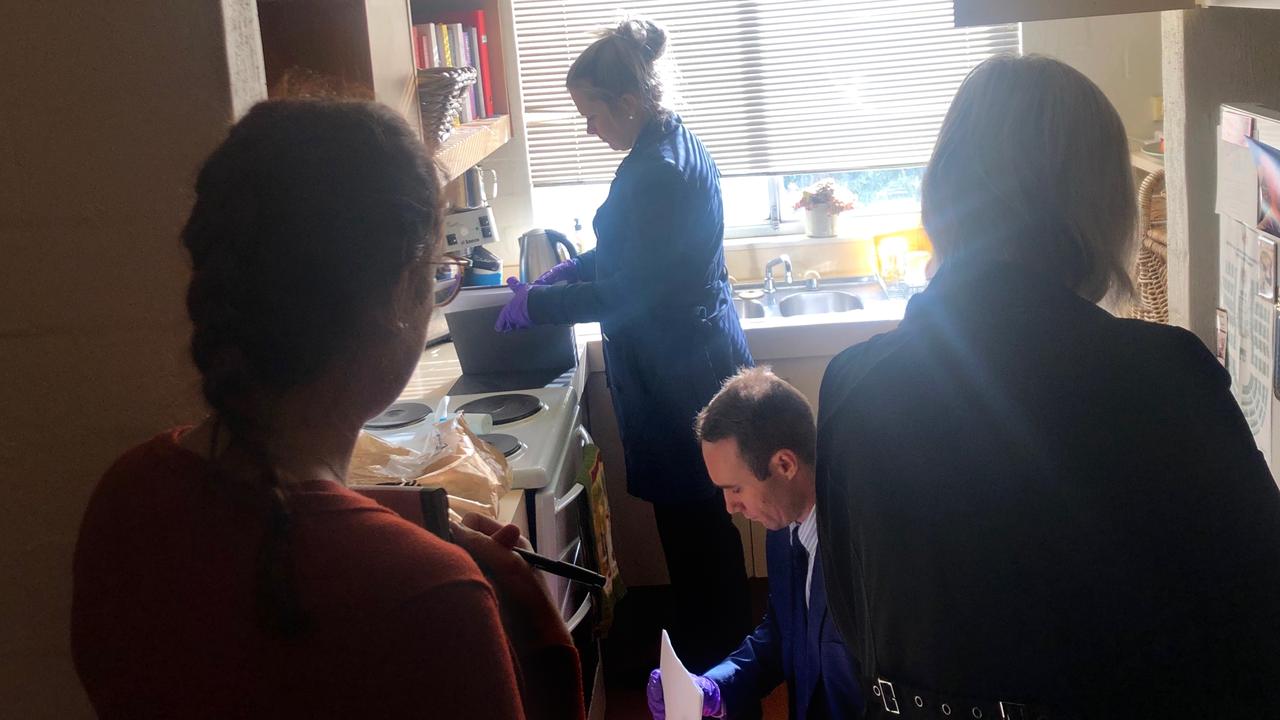‘You people’: Federal Police boss Neil Gaughan faces tense grilling over media raids
The head of the AFP has defended his media raids, referred journalists to the dictionary and explained why an undies drawer was searched.
The boss of the Australian Federal Police faced a tense and lengthy grilling by the media in Canberra as he attempted to justify two extraordinary raids this week.
Neil Gaughan, the acting commissioner of the AFP, insisted there was no involvement by the government or individual ministers in the investigations into reports by the ABC and News Corp Australia.
While the timing of two unprecedented searches on two consecutive days was not coincidental, Mr Gaughan said it was to do with staff resourcing and not an attempt to “show force” and intimidate journalists.
The AFP has been under pressure to explain itself after raiding the Canberra home of New Corp Australia political editor Annika Smethurst on Tuesday.
Yesterday, it executed a search warrant at the Sydney headquarters of the ABC, reviewing almost 10,000 documents.
Mr Gaughan said the two separate investigations were sparked by the leaking of “top secret and classified” documents by a person or persons within the federal government.
“The compromise of such material could cause exceptionally grave damage to the national interest, organisations or indeed individuals,” he said.
Although, he didn’t explain why a serious matter of national security saw raids conducted two years after the ABC reports ran and more than a year after Smethurst’s story was published.

He also attacked the use of the word “raid” in reporting in recent days, taking exception to the connotations that came with it.
Journalists attending the briefing at the AFP’s headquarters in Canberra — who he referred to as “you people” — were told to look up the Macquarie Dictionary definition of “raid”.
“Raid has a certain connotation that I find, in relation to these particular issues, not quite right,” he said.
Mr Gaughan defended the actions of the seven officers who spent seven hours inside Smethurst’s home, rifling through her underwear drawer, bathroom cabinet and kitchen cupboards.
“We were looking for USBs,” he said.
“USBs by their nature are quite small and easy to conceal in different locations. That’s why the search was conducted in accordance with our standard procedure in that we would always search those particular locations.”
He didn’t explain why then officers flicked through every page of her recipe books, as Smethurst detailed in The Australian today.
RELATED: Timing of AFP raids stinks to high heaven


Mr Gaughan also took a jab at the decision by the ABC to film the arrival of officers yesterday and at executive editor John Lyons for live-tweeting the raid.
“I might add that the only way it was turned into a public display was based on what the ABC did when we arrived yesterday,” he said.
Apparently AFP members have been “subjected to unprecedented scrutiny†this week. pic.twitter.com/6wV6zjxSe8
— Annika Smethurst (@annikasmethurst) June 6, 2019
However, he pointed out the fact that the officers “allowed it” was a sign of the AFP’s support of press freedom.
He disagreed the raids were intended to intimidate journalists but would not be drawn on why Smethurst’s home, and not her office, was searched, nor why the ABC raid was of its Sydney offices and not in Melbourne, where the two journalists targeted are based.
“I’m not going to give you a song and dance,” Mr Gaughan said.
RELATED: PM opens door for law change after AFP raids on journalists

Apart from initially advising the departments of Home Affairs and Defence it had started an investigation, in 2017 and 2018 respectively, there had been no briefings or updates provided to the government, Mr Gaughan said.
No one in the departments, nor the relevant ministers, were given advanced advice about the two raids.
He also said the decision about the timing of the raids, just weeks after the federal election, was his alone and the election “did not factor in”.
“Any inference that suggests our decisions were influenced by anyone outside the organisation are strongly refuted,” he said.

On whether any journalists could face criminal prosecution, Mr Gaughan said “we haven’t made a decision” but indicated Smethurst was in the clear.
But he couldn’t answer questions over whether the AFP was taking as seriously the leak of ASIO advice to Cabinet, seemingly by someone within it, to the media last year.
When asked whether he thought it “peculiar that no people holding public office or politicians had been the subject of search warrants” regarding the high-level breach, he said “no”.
The two raids and the broad scope of the search warrant executed at the ABC have sparked international condemnation from media organisations and journalism lobby groups.
The ABC raid was sparked by 2017 reports based on leaked top-secret Defence documents, which highlighted serious allegations of war crimes by Australian soldiers in Afghanistan.
The extended search of Smethurst’s house was prompted by an April 2018 report about a secret plan to allow the cyber spy agency to snoop on Australian citizens.
Her report included confidential correspondence between the bosses of the Department of Home Affairs and Department of Defence.




